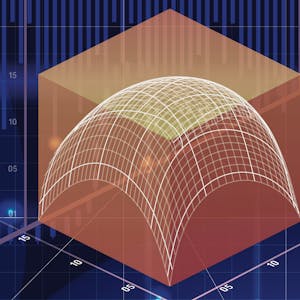Response Surfaces, Mixtures, and Model Building
Factorial experiments are often used in factor screening.; that is, identify the subset of factors in a process or system that are of primary important to the response. Once the set of important factors are identified interest then usually turns to optimization; that is, what levels of the important factors produce the best values of the response. This course provides design and optimization tools to answer that questions using the response surface framework. Other related topics include design and analysis of computer experiments, experiments with mixtures, and experimental strategies to reduce the effect of uncontrollable factors on unwanted variability in the response.
Conduct experiments w/computer models and understand how least squares regression is used to build an empirical model from experimental design data
Understand the response surface methodology strategy to conduct experiments where system optimization is the objective
Recognize how the response surface approach can be used for experiments where the factors are the components of a mixture
Recognize where the objective of the experiment is to minimize the variability transmitted into the response from uncontrollable factors
Syllabus
Syllabus - What you will learn from this course
Week 1
Unit 1: Additional Design and Analysis Topics for Factorial and Fractional Factorial Designs
Week 2
Unit 2: Regression Models
Week 3
Unit 3: Response Surface Methods and Designs
Week 4
Unit 4: Robust Parameter Design and Process Robustness Studies
FAQ
When will I have access to the lectures and assignments?
Access to lectures and assignments depends on your type of enrollment. If you take a course in audit mode, you will be able to see most course materials for free. To access graded assignments and to earn a Certificate, you will need to purchase the Certificate experience, during or after your audit. If you don't see the audit option:
What will I get if I subscribe to this Specialization?
When you enroll in the course, you get access to all of the courses in the Specialization, and you earn a certificate when you complete the work. Your electronic Certificate will be added to your Accomplishments page - from there, you can print your Certificate or add it to your LinkedIn profile. If you only want to read and view the course content, you can audit the course for free.
Is financial aid available?
Yes. In select learning programs, you can apply for financial aid or a scholarship if you can’t afford the enrollment fee. If fin aid or scholarship is available for your learning program selection, you’ll find a link to apply on the description page.
Reviews
It was a great experience for me to do the RSM model building an online course. I learned experimental designs for fitting response surfaces.
DoE is an essential but forgotten initial step in the experimental work! This course gives a very good start and breaking the ice for higher quality of experimental work.
